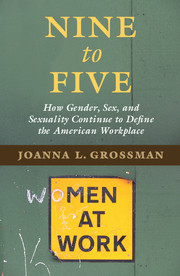Book contents
- Frontmatter
- Dedication
- Contents
- Foreword
- Acknowledgments
- Introduction
- PART I WHAT IS SEX DISCRIMINATION?
- PART II SEXUAL HARASSMENT
- 12 Workplace Affairs and Sexual Favoritism
- 13 Lolita at the Office
- 14 Sex Talk in the Writers’ Room
- 15 Sex Behind Bars
- 16 When the Supervisor Bullies Only Women
- 17 The Equal Opportunity Harasser
- 18 Periodontal Perils
- 19 Punishing Effeminacy
- 20 Late-Night Affairs with David Letterman
- 21 Why Herman Cain Has Not Been Able to Talk His Way Out of His Exploding Sexual Harassment Scandal
- 22 Why Hostile Environment Harassment Is a “Continuing Violation”
- 23 When Sexual Extortion Is Successful
- 24 The Consequences of Failing to Complain about Harassment
- 25 Who Is Responsible for Sudden, Severe Harassment?
- 26 Chinks in the Harassment Law Armor
- 27 Do Employer Efforts Prevent Harassment or Just Prevent Liability?
- 28 Who's the Boss?
- 29 Costly Mistakes
- 30 Hands Off the Merchandise
- PART III PREGNANT WOMEN AND MOTHERS AT WORK
- PART IV FEMALE BREADWINNERS AND THE GLASS CEILING
- Conclusion
- Notes
- Index
29 - Costly Mistakes
from PART II - SEXUAL HARASSMENT
Published online by Cambridge University Press: 05 May 2016
- Frontmatter
- Dedication
- Contents
- Foreword
- Acknowledgments
- Introduction
- PART I WHAT IS SEX DISCRIMINATION?
- PART II SEXUAL HARASSMENT
- 12 Workplace Affairs and Sexual Favoritism
- 13 Lolita at the Office
- 14 Sex Talk in the Writers’ Room
- 15 Sex Behind Bars
- 16 When the Supervisor Bullies Only Women
- 17 The Equal Opportunity Harasser
- 18 Periodontal Perils
- 19 Punishing Effeminacy
- 20 Late-Night Affairs with David Letterman
- 21 Why Herman Cain Has Not Been Able to Talk His Way Out of His Exploding Sexual Harassment Scandal
- 22 Why Hostile Environment Harassment Is a “Continuing Violation”
- 23 When Sexual Extortion Is Successful
- 24 The Consequences of Failing to Complain about Harassment
- 25 Who Is Responsible for Sudden, Severe Harassment?
- 26 Chinks in the Harassment Law Armor
- 27 Do Employer Efforts Prevent Harassment or Just Prevent Liability?
- 28 Who's the Boss?
- 29 Costly Mistakes
- 30 Hands Off the Merchandise
- PART III PREGNANT WOMEN AND MOTHERS AT WORK
- PART IV FEMALE BREADWINNERS AND THE GLASS CEILING
- Conclusion
- Notes
- Index
Summary
In August 2012, titillating reports emerged about the sexually charged atmosphere in the office of New York State Assemblyman Vito Lopez, including his preference that his female employees not wear bras to work. Two women filed complaints against Lopez for sexual harassment, and the Assembly released a letter in which it reported on the resolution of the women's claims. The Ethics Committee censured Lopez, stripped him of his committee chairmanship, and barred him from hiring interns or employees under the age of twenty-one.
There are many disturbing aspects of this story – the flagrancy of the harassment and the raw abuse of power, among others. But perhaps most disturbing is that these were not the first claims of harassment against Lopez. Previous claims had been made, and secretly and expensively settled. Why would the Assembly allow this behavior to continue unchecked? Why would Lopez himself not be deterred by potential consequences to his pocketbook and political career? Forget the desire to ensure a nondiscriminatory work environment for all employees, which we perhaps naively hope that employers harbor. Isn't the fear of costly jury verdicts or settlements sufficient incentive for employers to intervene to stop known harassment problems? That is the question the New York State Assembly ought to be asking itself this week – and over the many weeks and months ahead when the repercussions of Lopez's alleged chain of harassment horror are acutely felt.
Meanwhile, Chrysler, the auto giant, should have asked itself the same question, as it wrote a check for the $3.5 million punitive-damage verdict that was reinstated by the U.S. Court of Appeals for the Seventh Circuit, in a racial harassment case, May v. Chrysler.
Are there lessons for other employers in the cases against Lopez and Chrysler?
THE LOPEZ PROBLEM: WHY WASN'T HE STOPPED EARLIER?
With respect to the claims against Lopez, Assembly Speaker Sheldon Silver reported that, according to an internal investigation, Lopez was guilty of “pervasive unwelcome verbal conduct,” as well as unwanted groping and kissing of female staff members. As detailed in the Assembly's letter to Lopez, the committee found substantiated reports of “multiple incidents of unwelcome physical conduct toward one complainant, wherein you put your hand on her leg, she removed your hand, and you then put your hand between her upper thighs, putting your hand as far up between her legs as you could go.”
- Type
- Chapter
- Information
- Nine to FiveHow Gender, Sex, and Sexuality Continue to Define the American Workplace, pp. 168 - 173Publisher: Cambridge University PressPrint publication year: 2016



